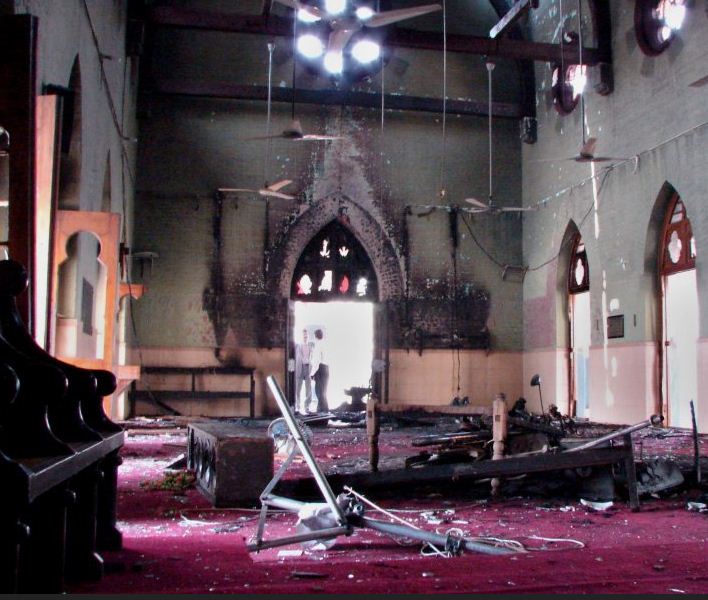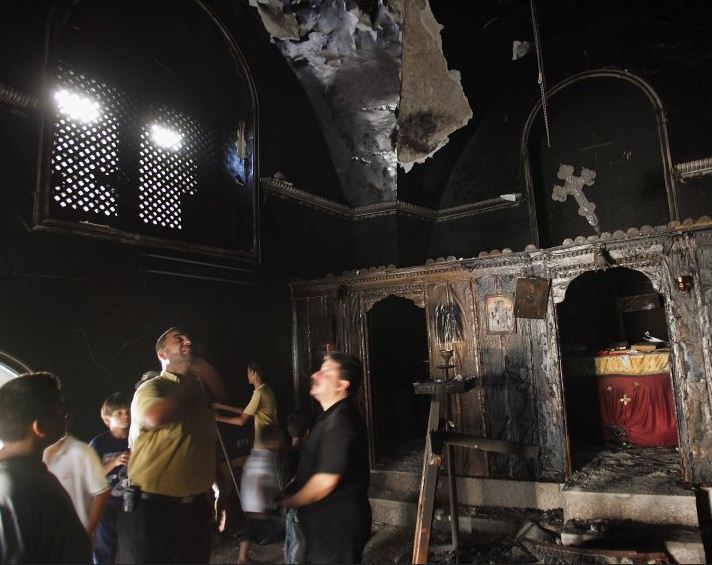Christianity being wiped out in the Middle East
A new report entitled 'Christianophobia' and published by Westminster think-tank Civitas 'lays bare the scale of the vendetta against Christians'.
A church in the city of Sukkur in Pakistan after being attacked
 Christianity is in serious danger of being wiped out in its biblical heartlands because of Islamic oppression, according to a new publication from a leading independent think- tank. Christianity is in serious danger of being wiped out in its biblical heartlands because of Islamic oppression, according to a new publication from a leading independent think- tank.
The report, entitled Christianophobia, written by journalist Rupert Shortt and published by Westminster think-tank Civitas, lays bare the scale of the vendetta against Christians across the globe.
It states that Western governments and media largely ignore the widespread persecution of Christians in the Middle East and the wider world because they are afraid they will be accused of racism.
In failing to acknowledge the violence and see it as the "canary in the mine" the report accuses the politicians of also jeopardising the wider concept of human rights. The author suggests that refusal of young Christians in the West to become "radicalised" and mount violent protests against the attacks on their faith also helps to explain the "blind spot" about "Christianophobia" in influential liberal Western circles.
As a result Christian believers are more likely to be the target of discrimination or persecution than any other religious group; and they are particularly at risk in Muslim-dominated societies. Oppression is magnified by anti-Americanism and the false belief that Christianity is a "Western" creed, even though it originated in the Middle East and has been an integral part of that region's belief systems for 2000 years.
between a half and two-thirds of Christians in the Middle East have left or been killed over the past century.
|
Mr Shortt quotes expert findings that between a half and two-thirds of Christians in the Middle East have left or been killed over the past century and observes that the pace of this assault is now intensifying with the rise of militant Islam in countries such as Egypt, Iraq and now, with the civil war, Syria.
According to the author some 200 million Christians (10 per cent of the total and across the world as a whole) are socially disadvantaged, harassed or actively oppressed for their beliefs. Mr Shortt writes:
"Exposing and combating the problem ought in my view to be political priorities across large areas of the world. That this is not the case tells us much about a questionable hierarchy of victimhood.
"The blind spot displayed by governments and other influential players is causing them to squander a broader opportunity. Religious freedom is the canary in the mine for human rights generally."
The report surveys in detail the extent of Christian persecution in seven countries - Egypt, Iraq, Pakistan, Nigeria, Burma, China and India. And it cites findings from the American-based Freedom House think-tank report to highlight the way that Muslim-majority countries are the most hostile to Christians.
They impose the greatest curbs on religious freedoms and make up 12 of the 20 countries judged to be "unfree" on the grounds of religious tolerance. Of the seven states receiving the lowest possible score, four are Muslim.
Mr Shortt traces the rise of Christianophobia in Egypt to the early 1970s when the quadrupling of oil prices gave Saudi Arabian religious extremists the material means to export their intolerant views around the world.
Reports of atrocities involving the deaths of scores of Christians in the 1970s were followed by steady deterioration in the 1980s and 1990s when the death rate multiplied into the hundreds in many separate attacks.
More recently, in January 2010, 13 worshippers were killed when they came out of St George's Church in Nag Hammadi, near Luxor.
A Greek Orthodox church in the West Bank
attacked after comments from the Pope on Islam
 Mr Shortt illustrates the mounting hostility to Christians by quoting the Salafist website 'Guardians of the Faith', which published an article saying "Being a Muslim girl whose role models are the wives of the Prophet, who were required to wear the hijab, is better than being a Christian girl, whose role models are whores." Mr Shortt illustrates the mounting hostility to Christians by quoting the Salafist website 'Guardians of the Faith', which published an article saying "Being a Muslim girl whose role models are the wives of the Prophet, who were required to wear the hijab, is better than being a Christian girl, whose role models are whores."
The problem is compounded by the fact that "many Egyptian Muslims think that Copts are implicated in what they see as a Christian assault on the Muslim world, because of George W. Bush's use of the term 'crusade' after 9/11.
"Others maintain that Bush's ill-chosen words and mistaken policies have provided a convenient excuse for aggression against minority groups which patently have no connection with Western governments."
Iraq has also witnessed the decimation of its Christian community amid frequent bombings, shootings, beheadings and kidnappings, especially since the invasion of 2003.
In 1990 there were between 1.2 to 1.4 million Christians in Iraq. By 2003, there were only around half a million. Today there are less than 200,000. Christians are also under pressure in non-Muslim countries.
Mr Shortt points out that more Christians are imprisoned in China than in any other country in the world. It is estimated that almost 2000 members of house churches were arrested during the 12 months after May 2004 alone.
This is in a country where "public security officials have the right to imprison people for up to three years without trial," he points out.
"There is a theory that the idea of jihad is more deeply embedded in Islam than related notions in the other world religions - and therefore that Islam is more susceptible to violent extremism - because of the martial context in which Islam took root."
The report however also covers the issue of Christians committing acts of violence against other faiths, highlighting the activities in the 1970s and 1980s of Lebanese Phalangist militias were dominated by Maronites in communion with the see of Rome.
Also during the 1990's Balkan conflict, Orthodox Christians (and ex-Communists who used their religious heritage as a flag of convenience) were guilty of extreme aggression against Muslims and Catholics in the Balkans.
The author concludes that it took Christian societies many centuries to evolve a tradition of tolerance towards other faiths and expresses the hope that Islam might eventually reach the same destination.
Footnotes: Civitas: The Institute For The Study Of Civil Society, is a leading independent Westminster think tank. The full re 'Christianophobia' report can be obtained here.
The Christian organisation Barnabus Fund is active both in reporting on the persecution of Christians around the world and also practically supporting those who are suffering because of it. |